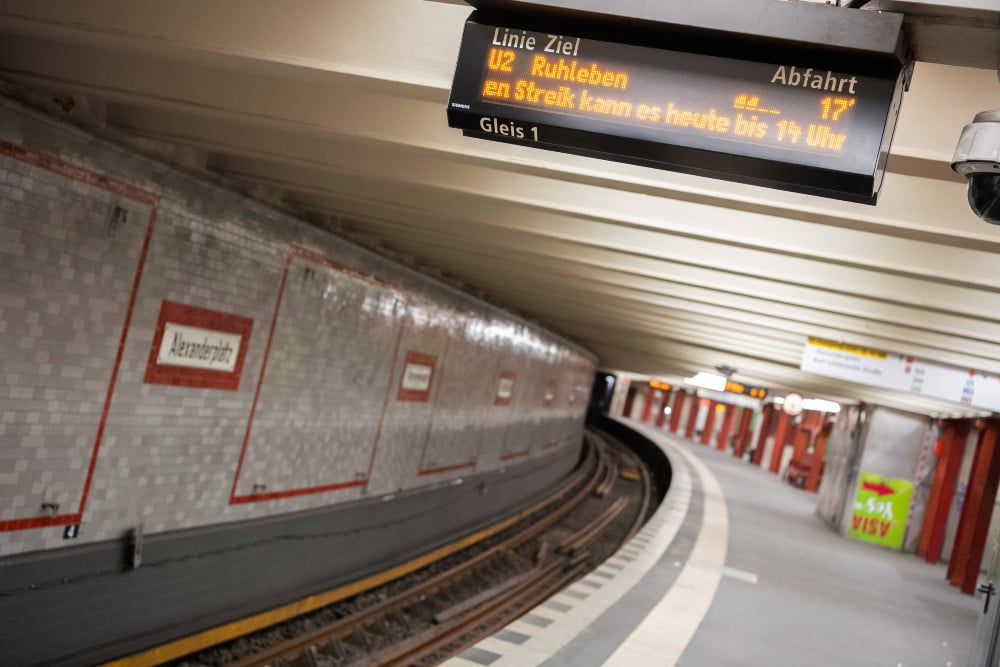Where are public transport strikes taking place this week in Germany?

Public transport passengers around Germany should expect delays and some cancellations this week, as 90,000 employees from local transport companies are striking on various days from Monday to Saturday.
Trade union Verdi has announced that actions are planned across Germany this week with the most strikes scheduled for Friday, March 1st.
This is the second time this month that public transportation workers have stopped work across Germany, following strikes that took place on February 2nd. That's in addition to a number of regional transit strikes throughout the month as well.
Generally the number of strikes will ramp up through the week. Bavaria is the only German state where no strikes are currently scheduled.
READ ALSO: More local public transport strikes called across Germany
Strikes begin in Berlin and the northernmost state of Schleswig-Holstein
In Berlin strikes have already begun. An initial strike started at 3 am, and lasted until 2 pm, on Monday.
Berliner Verkehrsbetriebe (BVG) passengers can expect delays and cancellations of buses, the U-Bahn and trams in the city.
According to the Berliner Morgenpost, however, BVG has announced that all transport lines are still in use despite the strike. Some bus lines have longer waiting times, and individual U-Bahn trips are cancelled. Ferries are not affected by the strike.
After Monday’s initial BVG stoppage, a wider ranging Berlin strike is expected on Thursday February 29th and Friday March 1st, which will coincide with a climate strike called for by Friday’s for Future. The strike in Berlin lasts all day Thursday and is due to end on Friday at 2pm.
Work stoppages by bus drivers in Germany’s northernmost state of Schleswig-Holstein are also already underway. A Verdi spokesman estimated the cancellations in bus services on Monday morning are at about 85 percent in this region.

A sign at Berlin's Alexanderplatz on Monday morning warns that there could be delays until 2 pm due to the strike. Photo: picture alliance/dpa | Paul Zinken
Strikes in Bremen, Hamburg, and Lower Saxony
In Hamburg, buses and subways are expected to strike on Thursday and Friday (February 29th and March 1st). The S-Bahn will continue to run as usual.
In Bremen there will be a strike on Wednesday (February 28th). Bremerhaven, however, is not to be affected.
In Lower Saxony, local strikes will take place on different days. In Göttingen it will start on Wednesday, whereas other cities are expected to strike from Thursday.
Those who may be affected in Lower Saxony are advised to check with their local transport companies.
Strikes in Rhineland-Palatinate and Saarland, and North-Rhine Westphalia and Hesse
By Monday afternoon, warning strikes are expected also in Saarland and in the Trier region.
In North Rhine-Westphalia, companies have called for a strike on Thursday, February 29th and Friday, March 1st.
In Hesse a strike is also scheduled for March 1st. Restrictions are expected to impact bus, road and U-Bahn traffic.
Further strikes in Mecklenburg-Western Pomerania
In Mecklenburg-Western Pomerania, several local transportation companies already went on strike from the 21st to 22nd of February.
But municipal companies throughout the state have called for another strike on March 1st. Neubrandenburg is the one exception where no strike is scheduled.
Some strikes in the south
Bavaria is spared from travel blockages, as it is the only German state where no strikes are announced this week.
On the other hand, those in Baden-Württemberg should expect a strike on March 1st, and further strikes may be announced by Monday afternoon.
According to Taggeschau, Verdi said it “will announce our strike days in good time so that passengers can prepare for them". The union added that until then, no strike effects are to be expected in Stuttgart and Esslingen.
Generally, actions are not expected to be planned for Baden-Württemberg until the end of the week.
Why are transport workers striking again?

A "warning strike" sign in front of the entrance to the depot of Kieler Verkehrsgesellschaft at the beginning of February. Verdi is calling on all employees of public bus companies to continue a series of warning strikes until the end of service on Friday. Photo by picture alliance/dpa | Axel Heimken
Those who depend on public transportation to commute to work or for their daily errands will likely experience some service disruptions this week – specifically on Friday. March 1st in most places.
Many passengers may be wondering why public transportation workers are striking again for the second time in a month.
Berlin’s BVG transport association told the Berliner Morgenpost that the strike was "completely disproportionate and irresponsible with regard to our passengers". But Verdi says the strike is mainly about improving the working conditions and relieving the burden on transport employees.
In addition to the introduction of a 35-hour week, the union is demanding that the length of shifts be limited to a maximum of ten hours. They also want the minimum rest period between shifts extended to twelve hours.
Bus drivers and transportation workers across Germany suggest that the burden of the job has gotten worse in recent years as more workers leave the profession.
“Many of my colleagues leave the profession within two years,” Mathias Kurreck, a bus driver who has worked with BVG for 17 years, told The Local. He cited long shifts with few breaks, and not enough time off to spend with family as being among his biggest concerns.
READ ALSO: Why Germany is being hit by strikes almost every day
Comments
See Also
Trade union Verdi has announced that actions are planned across Germany this week with the most strikes scheduled for Friday, March 1st.
This is the second time this month that public transportation workers have stopped work across Germany, following strikes that took place on February 2nd. That's in addition to a number of regional transit strikes throughout the month as well.
Generally the number of strikes will ramp up through the week. Bavaria is the only German state where no strikes are currently scheduled.
READ ALSO: More local public transport strikes called across Germany
Strikes begin in Berlin and the northernmost state of Schleswig-Holstein
In Berlin strikes have already begun. An initial strike started at 3 am, and lasted until 2 pm, on Monday.
Berliner Verkehrsbetriebe (BVG) passengers can expect delays and cancellations of buses, the U-Bahn and trams in the city.
According to the Berliner Morgenpost, however, BVG has announced that all transport lines are still in use despite the strike. Some bus lines have longer waiting times, and individual U-Bahn trips are cancelled. Ferries are not affected by the strike.
After Monday’s initial BVG stoppage, a wider ranging Berlin strike is expected on Thursday February 29th and Friday March 1st, which will coincide with a climate strike called for by Friday’s for Future. The strike in Berlin lasts all day Thursday and is due to end on Friday at 2pm.
Work stoppages by bus drivers in Germany’s northernmost state of Schleswig-Holstein are also already underway. A Verdi spokesman estimated the cancellations in bus services on Monday morning are at about 85 percent in this region.

Strikes in Bremen, Hamburg, and Lower Saxony
In Hamburg, buses and subways are expected to strike on Thursday and Friday (February 29th and March 1st). The S-Bahn will continue to run as usual.
In Bremen there will be a strike on Wednesday (February 28th). Bremerhaven, however, is not to be affected.
In Lower Saxony, local strikes will take place on different days. In Göttingen it will start on Wednesday, whereas other cities are expected to strike from Thursday.
Those who may be affected in Lower Saxony are advised to check with their local transport companies.
Strikes in Rhineland-Palatinate and Saarland, and North-Rhine Westphalia and Hesse
By Monday afternoon, warning strikes are expected also in Saarland and in the Trier region.
In North Rhine-Westphalia, companies have called for a strike on Thursday, February 29th and Friday, March 1st.
In Hesse a strike is also scheduled for March 1st. Restrictions are expected to impact bus, road and U-Bahn traffic.
Further strikes in Mecklenburg-Western Pomerania
In Mecklenburg-Western Pomerania, several local transportation companies already went on strike from the 21st to 22nd of February.
But municipal companies throughout the state have called for another strike on March 1st. Neubrandenburg is the one exception where no strike is scheduled.
Some strikes in the south
Bavaria is spared from travel blockages, as it is the only German state where no strikes are announced this week.
On the other hand, those in Baden-Württemberg should expect a strike on March 1st, and further strikes may be announced by Monday afternoon.
According to Taggeschau, Verdi said it “will announce our strike days in good time so that passengers can prepare for them". The union added that until then, no strike effects are to be expected in Stuttgart and Esslingen.
Generally, actions are not expected to be planned for Baden-Württemberg until the end of the week.
Why are transport workers striking again?

Those who depend on public transportation to commute to work or for their daily errands will likely experience some service disruptions this week – specifically on Friday. March 1st in most places.
Many passengers may be wondering why public transportation workers are striking again for the second time in a month.
Berlin’s BVG transport association told the Berliner Morgenpost that the strike was "completely disproportionate and irresponsible with regard to our passengers". But Verdi says the strike is mainly about improving the working conditions and relieving the burden on transport employees.
In addition to the introduction of a 35-hour week, the union is demanding that the length of shifts be limited to a maximum of ten hours. They also want the minimum rest period between shifts extended to twelve hours.
Bus drivers and transportation workers across Germany suggest that the burden of the job has gotten worse in recent years as more workers leave the profession.
“Many of my colleagues leave the profession within two years,” Mathias Kurreck, a bus driver who has worked with BVG for 17 years, told The Local. He cited long shifts with few breaks, and not enough time off to spend with family as being among his biggest concerns.
READ ALSO: Why Germany is being hit by strikes almost every day
Join the conversation in our comments section below. Share your own views and experience and if you have a question or suggestion for our journalists then email us at [email protected].
Please keep comments civil, constructive and on topic – and make sure to read our terms of use before getting involved.
Please log in here to leave a comment.